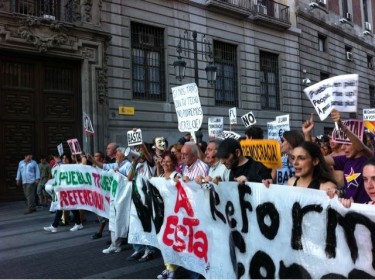Political and social debate in Spain has been intense these past few months. The latest news that has once again caused thousands to take to the streets in protest is the so-called #reformazo (#bigreform). It refers to changes to the Spanish Constitution made by the PSOE (Spanish Socialist Workers’ Party), with the support of the PP (People's Party) — changes implemented just three months short of the general elections, during the height of the summer, without any warning to the people or to other congressional groups, and bereft of even the slightest debate among the ranks of the very political parties behind the reform.
The article in question is 135, with the changes intended to limit public spending on account of the current economic crisis, yet owed in part to pressure from the so-called financial markets and coming top-down from Europe.
Article 135 of the Spanish Constitution will now read as follows:
- All governments shall adjust operations to honor the principle of a budgetary stability.
- The federal government and the autonomous communities may not assume a structural deficit greater than those margins so established by the European Union for member states. Constitutional law will determine the maximum legally permitted budget deficit for the federal government and autonomous communities as a percentage of their GDP. Local governments must present a balanced budget.
- The federal government and autonomous communities must be authorized by law to issue public debt or take out credit.
The debate has centered on two fronts, the political and the social.
Political debate has emerged from the ranks of the Socialist Party itself, with cases such as those of the congressional representative and the former secretary general of Workers’ Commissions (Spain's largest trade union), Antonio Gutiérrez, who announced he would not seek another candidacy if the policies of the Socialist Party continue on their current course, which involves adopting measures closer aligned with right-wing neoliberalism. Bear in mind the latest labor reforms implemented by the socialist government.
In turn, there have been protests throughout the country organized in part by the assemblies of Puerta del Sol and seconded by the entire 15M movement against what Real Democracy Now! has called the Financial Coup D'État.
That same day, typical cat-and-mouse tensions began to emerge between an already nervous police force and the press.
acampadasol: Thursday's agreed-upon slogan: “No to constitutional reform. Down with orders from the markets and (the) capital.” #AGSol
A change that will lead to the country's future shift to a loss of social benefits in the face of privatization and neoliberal policies and to which reporter Iñaki Gabilondo has recently made reference.
On September 2, the Congress approved the constitutional reform, with 316 representatives voting in favor and 5 against. The United Left (Izquierda Unida), represented by Gaspar Llamazares, opted to veto the vote so that the consensus between the PSOE and PP would not also benefit from the support of the Catalan congressional group CIU, whose votes would have given the reform more political strength.
Juan_Nadie: Gaspar Llamazares against the constitutional #reformazo (#bigreform) and in favor of the referendum: Text and video wp.me/p1IvYw-dc
actuable: More than 141,000 people request a constitutional referendum now bit.ly/qckZTZ #yoquierovotar (#iwanttovote)








2 comments